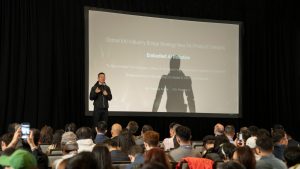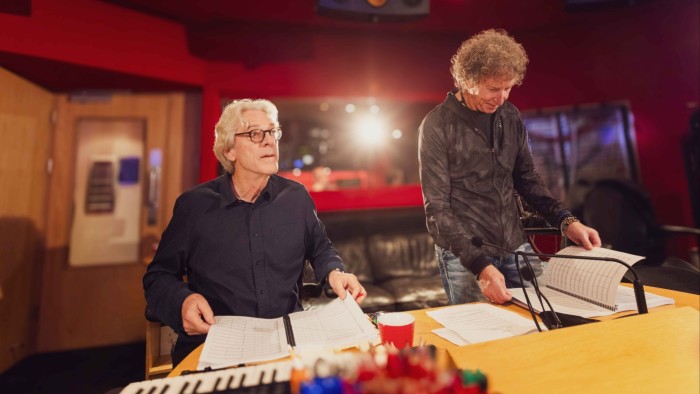Summarize this content to 2000 words in 6 paragraphs in Arabic During the time I spend with Stewart Copeland, the former Police drummer mimics the oscillating warble of a white-throated sparrow, the regular “whoop whoop” of a woodpecker and the moaning call of a spotted hyena — one of his favourite species, he tells me, with a matriarchal social system in which females disguise themselves as males. “Their vagina looks like a penis,” Copeland says animatedly. Someone at a table behind him jerks their head in our direction.The 10th greatest drummer of all time, according to a Rolling Stone top 100 list, is sitting in the bar area of a London hotel. He lives in Los Angeles with his wife Fiona, but has flown from New York following the Juilliard School’s premiere of a drum ensemble piece he has composed based on Edgar Allan Poe’s poem “The Bells”. It typifies his range of output since The Police came to a halt in the mid-1980s. Opera, ballet, film scores, soundtracks for television and video games, cross-genre collaborations: if Rolling Stone compiled a list of the most varied résumés in pop and rock, Copeland, 72, would surely be near the top again. His new album unites him with a non-human cast of vocalists. Wild Concerto is based around the sounds of animals screeching, growling and twittering. The music was recorded by an orchestra at Abbey Road Studios and features characteristically deft work by Copeland on drums. The animal noises are by renowned nature recordist Martyn Stewart, who over the course of 50 years has amassed a library of almost 100,000 field recordings.There are 12 instrumentals, or songs if the twitterers and screechers are considered as singers. “I have to make a confession,” Copeland says. “Although all these animals are beautifully arranged in close harmony, the reality is that some of the performers would predate on the other band members.” He gives a mischievous smile. “Not unlike some rock bands I know.”The album is being released in the run-up to Earth Day next week, an annual event promoting biodiversity. A dispiriting number of the featured species are endangered. But in contrast to Martyn Stewart and the album’s producer, Ricky Kej, Copeland is not motivated by environmental concerns.“I’m not so much the tree-hugger of this team,” he says. “I hope it will contribute to raising awareness. But no, I wasn’t thinking of saving the planet, I was thinking: ‘That’s a cool sound.’” The vocalisations on the album are mainly mating calls. “They are saying: ‘I’m here, where are you? Let’s get it on’, which is sort of the same as what humans do on the disco floor,” Copeland says. The musical style is at once playful and sophisticated, with an almost jazzy sense of swing. The warbling sparrow is matched with flute parts; howling wolves are shadowed by trombone. Meanwhile, Copeland’s delicate cymbal-work glints like sunlight.I mention zoomusicology to him, the study of animal communication and musicality. The concept is new to Copeland, whose ears prick up. “Hang on a moment,” he says. “One guy does it — moi — and they’ve got a whole word for it?”Yes, and I have bad news for him: Pink Floyd got there before him when they recorded a border collie barking to a blues song on their 1971 album Meddle.“Assholes,” Copeland says drily. “I have this problem with Pink Floyd all the time. The other one is the dotted eighth note.” He raps the table to illustrate how this musical progression works. “The repeat is timed to land there, which is very familiar from any Police record, on my drums or the guitar. Andy [Summers, guitarist] and I argued about who came up with it. Then [U2 guitarist] Edge picked it up and it became part of any guitarist’s vocabulary. But it turns out that Pink Floyd did it — a very slow version, but it’s that same dotted eighth note.”Copeland is entertaining company, with colourful musical plumage that he takes droll pleasure in fluttering. His father, Miles, was a US spy who co-founded the CIA, and also a jazz trumpeter. His mother, Lorraine, was a Scottish archaeologist. She inculcated a love of classical composers such as Ravel and Stravinsky, which “had much more impact” on him, in his words, than his father’s jazz.Born in the US in 1952, Copeland spent much of his childhood in Lebanon and England, where he went to boarding school. He was a member of the London prog-rock band Curved Air before forming The Police in 1977 with Sting. They were soon joined by Andy Summers. As shown by the dotted eighth note, the threesome had a rare ability to marry adventurous musicianship with mass appeal.Initially, they had to disguise their ambitions, a bit like the spotted hyena, so as to fit with punk-era shibboleths about lack of adornment and technique. Copeland believes that these constraints helped them to evolve.“For one thing, it taught Doris how to write a hit song,” he says, coming up with a jokey code name for Sting in order to avoid attracting further attention from neighbouring tables. “He had the instincts needed to write hit songs, such as beautiful melodies, but being surrounded by that world is what produced those results.”The Police reunited for a world tour in 2007 and 2008 but separated again afterwards. Copeland likes to compare himself and his former bandmates to silverback gorillas, competing for primacy with much chest-beating and noise. He had a particularly fraught working relationship with Sting, with whom he is otherwise friendly. Police lore abounds with tales of the pair clashing over how songs should be played.He and Sting “figured this out in band therapy decades later: the dichotomy of our purpose in making music.” The singer wanted his songs to be played exactly as he intended. But Copeland is less interested in the sanctity of songs than the expressive possibilities of music itself, the endless play of notes and pitch and timbre available to a gifted instrumentalist.“It is generally accepted that everything should serve the song,” he says. “But I bang shit because I like to bang shit. I don’t give a rat’s ass about the song. It is there to serve me and make the band look cool. The song is like the gasoline in the car. The car is not going anywhere without gasoline — but it’s not the car.”Wild Concerto’s focus on nature recalls Sting’s much-derided rainforest activism, which led to a South American tree frog species being named after him (Dendropsophus stingi). “Everyone sneers at that. I confess I did a bit of sneering myself,” Copeland says. But he praises the singer for his achievements.“He did something really significant. But no good deed goes unpunished. The first time I saw a brickbat being thrown at Doris was as a result of him doing a profoundly good deed. That’s sort of why I avoid the politics and the tree-hugging. I just bang stuff and make music, and hopefully some good will derive therefrom.”‘Wild Concerto’ is out on April 18 on Platoon Records
رائح الآن
rewrite this title in Arabic Stewart Copeland: ‘I just bang stuff and make music’
مال واعمال
مواضيع رائجة
النشرة البريدية
اشترك للحصول على اخر الأخبار لحظة بلحظة الى بريدك الإلكتروني.
© 2026 جلوب تايم لاين. جميع الحقوق محفوظة.










